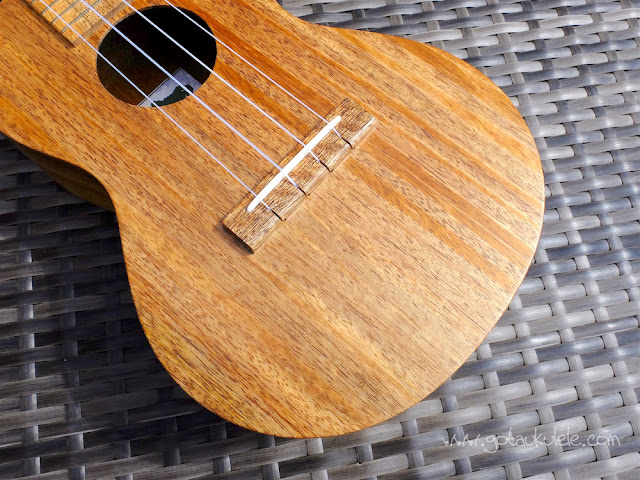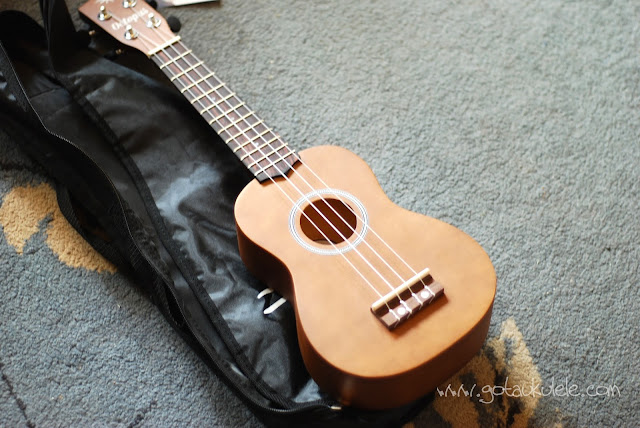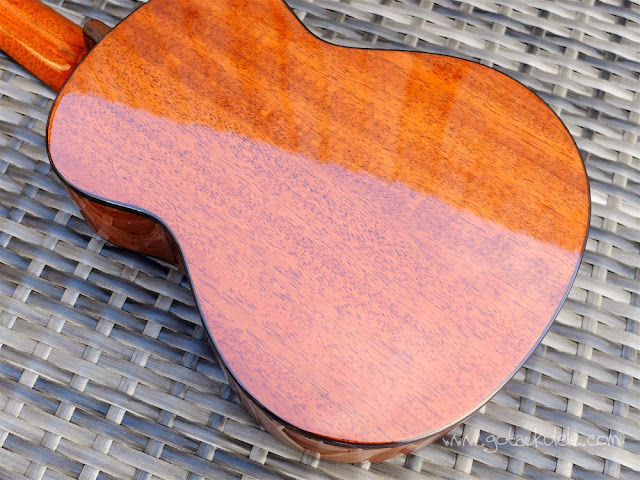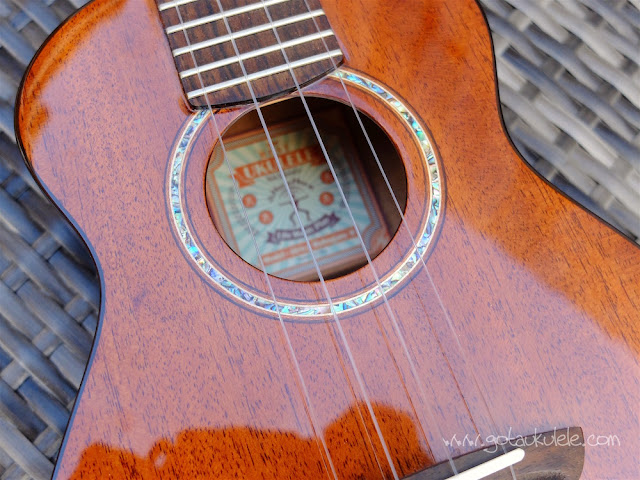A little while ago I put up a video explaining that any ukulele player should not be afraid of adjusting their instrument for optimum play. Ukuleles, like many stringed musical instruments are designed to have certain things adjusted to assist the player. It's called a 'setup'. For some reason it's an area that people are scared of but they really shouldn't be. That video is here by the way. (How To Adjust Ukulele Setup)
That was, however just a general introduction, and I thought it was about time that I actually did a demonstration video and written guide to look at one of these adjustments in a lot more detail. The action at the ukulele saddle.
The vast majority of ukuleles will come with a removeable saddle at the bridge end of the strings, and that is removable for a reason. It's the white strip, usually made of bone or plastic, sitting in the bridge mounting over which the tail end of the strings sits before being tied off. The bridge does a number of highly important things for the ukulele. Firstly, it transfers the vibration of the strings down into the soundboard. Secondly it sets the accurate scale length of each string - ie the vibrating length of the string for accurate intonation when you fret them. And thirdly it controls the height of the string off the top of the fingerboard. This last point is called the 'action' and it's what we are looking at today.
Often a ukulele can arrive with an overly high action, or can even develop a higher action over time as the stresses of the strings start to pull the neck up. They can also arrive with a low action. A high action makes it harder to press the strings down onto the frets at best, and if it is very high it can affect the tuning accuracy when played (the intonation). A low action can create buzzing as the action of plucking a string creates a wave down the length of it that can clip the top of the frets.
First of all, and contrary to many armchair expert advisors views, there is no perfect action setting that suits everybody. There is only an acceptable 'range'. And that is a range that gives the best compromise between playability and tuning accuracy. Go too high and you have the difficulty in fretting I mentioned above, and go too low and you create buzzing. One of the biggest myths is that you should set the action as low as you can go without buzzing. This is not particularly good advice as some very low, but non buzzing action settings can suck all tone and volume out of the strings. In short it needs to be a little higher than that. The point you go for is really down to you as a player. I know how I like my action (at the lower end) but not everybody does. The only way you will work that out is to try it.
What I find though is many players who have never considered adjusting their ukulele may be missing an opportunity. They struggle on with overly high action settings and think that it is 'just the way it is'.
So how do you measure your action? Well, you need to take a careful measurement of the distance between the bottom of the strings and the top of the 12th fret of the ukulele, this being the halfway point of the string. To measure this you really need to invest in a metal straight ruler with measurements that run right to the end of the metal so when you place it down at the tip you get an accurate reading. They are not expensive and available in all DIY stores for a few pounds. Even better you can use a string height ruler designed for stringed instruments which come with markings for common string heights in various formats. You simply hold the ruler on the top of the 12th fret and note the distance between the top of the fret and the bottom of the strings. You can check each one as on most ukuleles the fretboard is flat so they should be around the same (taking into account the different string thicknesses). (Note - if you do have a curved fingerboard, called a radius fingerboard, you will need to adjust for this).
What is the optimum? Well, like I say -it's a range really. That range depends on the string gauge and also how you play the ukulele. A more vigourous style of strumming will require a little more clearance to allow for the excessive string vibration. For me a low action would be about 6/64ths of an inch (or 0.093 inches, or about 2.2mm). At the upper end I would go no higher than about 8/64ths (or ⅛ inch, or 0.125 inches or about 3mm). If you check your instrument and you are below the lower figure it is likely you are on the verge of string buzz or not getting the optimum tone projection and you you need to raise the saddle. If you are above the higher figure, you may be finding it a chore to press the strings down on upper frets, or are finding your fingers are getting tangled on strums or even having intonation issues.
Now for the adjustment downwards. You can take the long winded path of removing the strings, sanding the base of the saddle a little, replacing it, re-stringing it, checking it, then repeating it until it is right. You can also use a bit of mathematics to help us. Because the string creates a very long thin triangle between the saddle and the top of the 12th fret, if you find your action at the 12th is (say) 0.5mm too high, because the 12th is the halfway point of the string, taking down the saddle by double that amount will lower the action at the 12th by 0.5mm. So it's a case of noting the height you are at, working out how much lower you want to take it, and then multiplying that by 2. That is the amount to drop the saddle by. Want to drop the action by 0.5mm, drop the saddle by 1mm.. and so on. You can then mark that depth on the saddle with a pencil and a straight edge.
Now the tricky part - you now need to sand down the base of the saddle (leave the top alone!!) to just reach the line you marked. The trick here is to keep the base of the saddle perfectly flat. If you dont do this you will find that the saddle will dip back or forward in the slot, affecting tuning, or wont make a clean contact with the soundboard. You can do this with a large piece of sandpaper on a hard surface working it slowly and monitoring what you are taking off. Even better is to put the saddle in a metal topped vice upside down with only the amount of saddle below your pencil mark visible. Even a cheap hobby vice will do as it's not a particularly strenuous job. You can then take a file, sandpaper or a Dremel to the base and be sure you are only taking off what you need. Sand it down, keeping it flat until you are at the marked point. I cannot stress enough how important it is to keep the base absolutely flat!
And that is it for a high action - replace the saddle and restring and you should be good to go. If you measured accurately you shouldn't face problems and your action will be lower.
Of course mistakes do happen though, so what if you go too low and create a buzzing? Or what if the saddle was too low to start with? Dont panic - this is easily remedied by simply putting a shim of thin card or wood veneer under the white saddle to raise it back up a little. You may need to add a couple of layers to get the saddle to the right height, and remember you can use that 'double the required height' rule. In other words, if your string action is 0.5mm too low at the 12th fret, raising it by about 1mm at the saddle will do the trick.
And if that lot has foxed you, I created another video that shows the process in more detail!
At the end of the day - the action should be right and there is no reason why you should struggle to play an instrument that is designed to be adjusted. A well adjusted ukulele can be a revelation. I see some shocking examples that people battle with and it need not be like this. Sure, you can pay someone to do this for you, but really it is SO easy to do - why would you do that? Get to know your instrument!!
Just go carefully and logically and you should be fine.
And as a final (final) word - there are some instruments that dont have removeable saddles. Many plastic ukuleles do and some others with moulded or carved wooden saddles. I am afraid this process wont work for you, and if you have high action you have a far more complex job on your hands involving taking the top of the saddle down. I would urge lots of caution here as whilst dropping the top will work, it is very easy to throw the shape of the saddle top out and create tuning issues. I'd seek professional help for those! There are also some rarer features on some ukuleles that can assist with buzzing strings called truss rods running through the length of the neck. You really dont see many of those though and they are more for neck relief and NOT for adjusting action. I may deal with those in a future post.
Good luck!
(and if you want a string action ruler - it's one of those things that Amazon are perfect for.
String Action ruler - Amazon.com
String Action ruler - Amazon.co.uk )
© Barry Maz
WHY NOT DONATE TO HELP KEEP GOT A UKULELE GOING?

THANKS!



































